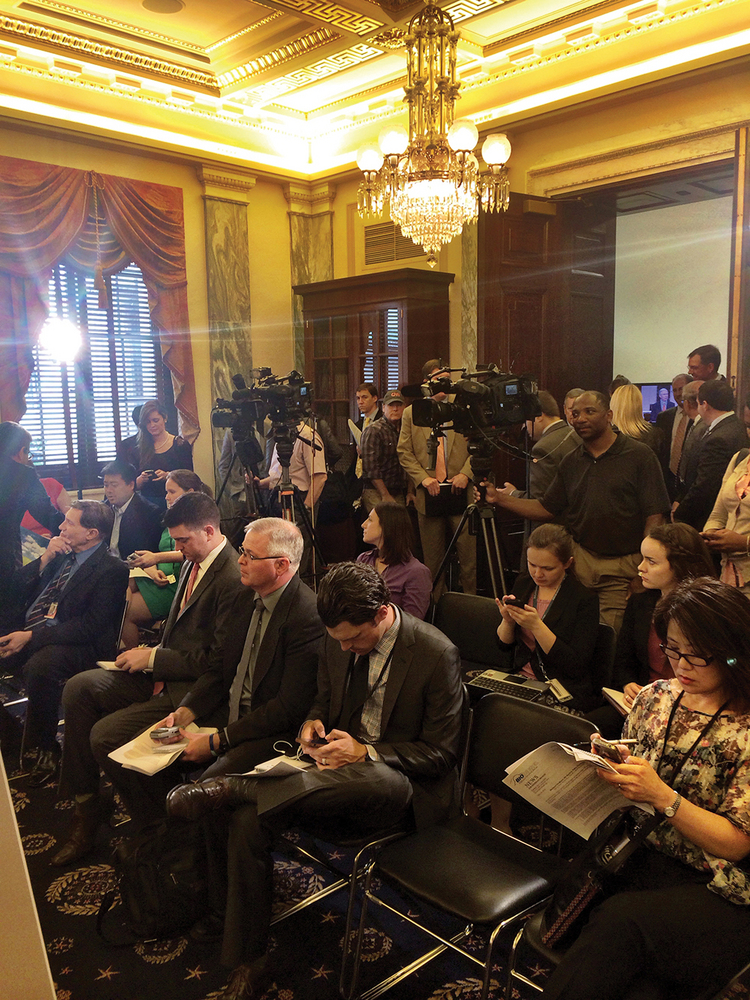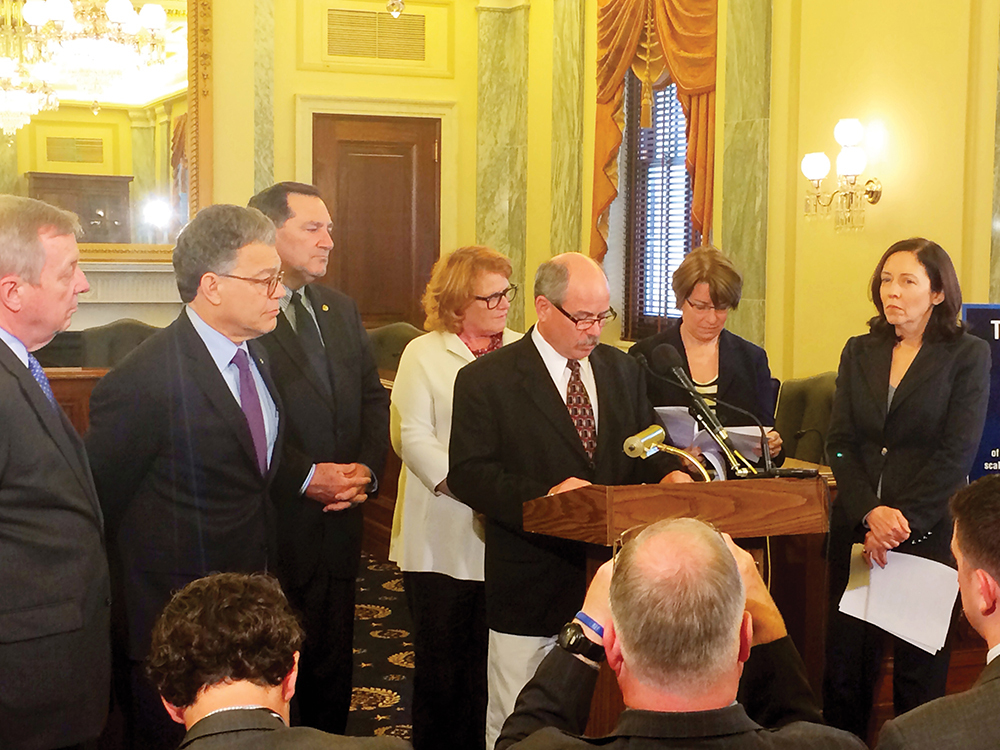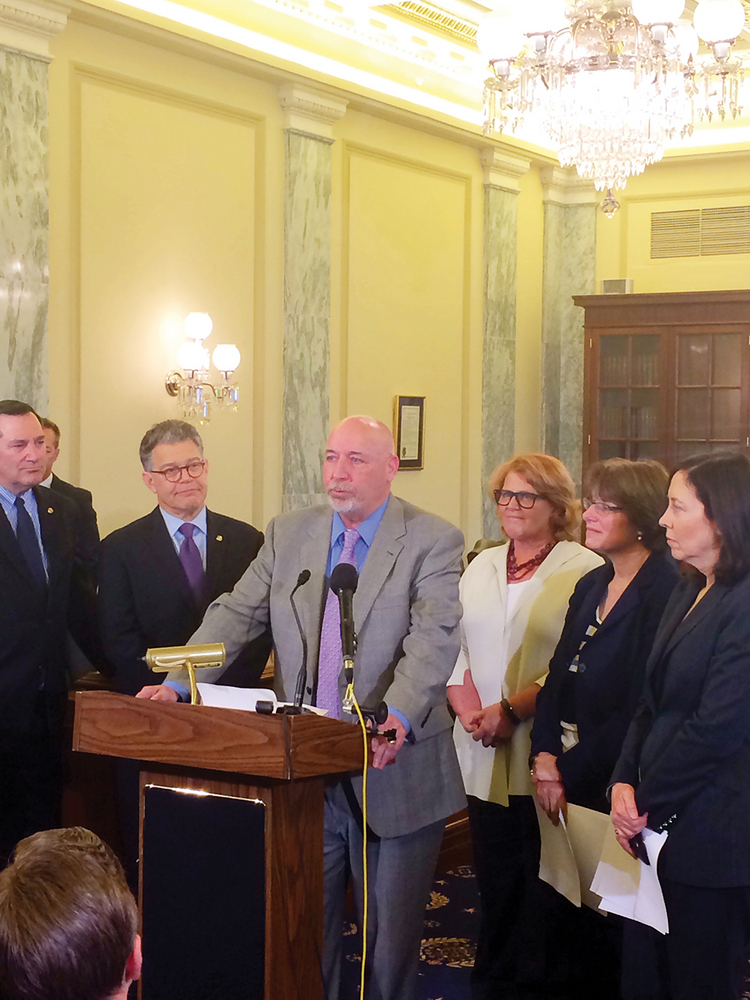Senators highlight unstable policy climate at May press event




July 31, 2014
BY NBB
A group of U.S. Senators came together with biodiesel producers and supporters in May calling on the administration to end policy uncertainty that is hurting the biodiesel industry by restoring a strong renewable fuel standard (RFS) and reinstating the biodiesel tax incentive. Led by Sen. Heidi Heitkamp, D-N.D., the group highlighted the results of the National Biodiesel Board’s biodiesel producer survey that showed significant negative impacts in the first part of 2014 due to unstable federal policy.
The press event helped draw media attention to the administration’s proposed retreat on the RFS and included Heitkamp, Dick Durbin, D-Ill., Maria Cantwell, D-Wash., Amy Klobuchar, D-Minn., Al Franken, D-Minn., and Joe Donnelly, D-Ind. Biodiesel industry representatives who participated included Jeff Haas, CEO of General Biodiesel in Seattle, Wayne Presby, owner of White Mountain Biodiesel in North Haverhill, N.H., Bryan Christjansen, general manager at Renewable Energy Group’s refineries in Albert Lea, Minn., and Mason City, Iowa, and Terry Goerger, a seed company owner and third-generation farmer from Mantador, N.D. Coverage of the event was extensive, including pieces by the Associated Press, Reuters, Roll Call, Politico, E&E News, The Seattle Times, and many more.
Heitkamp said during the press event that the administration’s proposal and the loss of the tax incentive hurts her state’s agriculture sector as well as its production plant in Velva, N.D.
“Biodiesel has an incredible success story to tell. Farmers in North Dakota and throughout the country are supporting good jobs, reducing our dependence on foreign oil, and boosting rural communities,” Heitkamp said. “But instead of promoting these successes, federal policies are dragging our farmers and producers down. That’s the wrong direction.”
Advertisement
Advertisement
Following the press event, NBB’s vice president of federal affairs Anne Steckel echoed the senator’s thoughts.
“Inconsistency in Washington is wreaking havoc on the U.S. biodiesel industry. It’s not just hurting these biodiesel producers. It is a setback for local economies where these plants operate, for our environment, for our national energy security, and for drivers who are tired of ever-increasing fuel prices that result from the petroleum industry’s monopoly at the pump.”
The producer survey was conducted by NBB between April 14 and April 25 with 54 producers across the country participating. Of those surveyed, nearly all attributed the industry decline to the weak RFS proposal and the loss of the biodiesel tax incentive.
April Biodiesel Producer Survey findings include:
Advertisement
Advertisement
• 78 percent had reduced production vs. 2013.
• 57 percent had idled production altogether or shut down a plant this year.
• 66 percent had reduced workforce or anticipated reducing workforce.
• 85 percent had delayed or canceled expansion plans.
This was the first time NBB had used a survey of producer members to quantify industry effects of policy decisions and while the numbers weren’t good news, it did provide valuable information for the industry’s champions in the Senate to call on the administration for change.
Related Stories
The U.S. EPA on July 8 hosted virtual public hearing to gather input on the agency’s recently released proposed rule to set 2026 and 2027 RFS RVOs. Members of the biofuel industry were among those to offer testimony during the event.
The USDA’s Risk Management Agency is implementing multiple changes to the Camelina pilot insurance program for the 2026 and succeeding crop years. The changes will expand coverage options and provide greater flexibility for producers.
President Trump on July 4 signed the “One Big Beautiful Bill Act.” The legislation extends and updates the 45Z credit and revives a tax credit benefiting small biodiesel producers but repeals several other bioenergy-related tax incentives.
CARB on June 27 announced amendments to the state’s LCFS regulations will take effect beginning on July 1. The amended regulations were approved by the agency in November 2024, but implementation was delayed due to regulatory clarity issues.
SAF Magazine and the Commercial Aviation Alternative Fuels Initiative announced the preliminary agenda for the North American SAF Conference and Expo, being held Sept. 22-24 at the Minneapolis Convention Center in Minneapolis, Minnesota.
Upcoming Events










